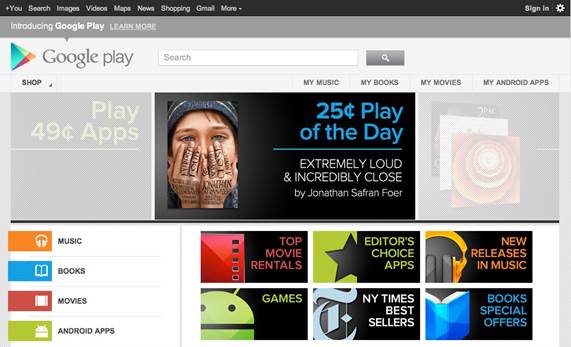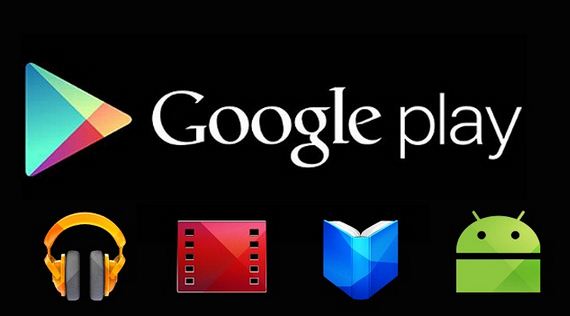Google Play Store & Software
The Google Play store is arguably the jewel
in Android's crown, giving Android users access to a library of software that
convincingly rivals Apple's legendary App Store. At the time of writing, the
two have near-identical numbers of applications (900,000 for the Google Play
store; 950,000 for the App Store) and both are closing on 50 billion downloads.

The
Google Play store is arguably the jewel in Android's crown, giving Android
users access to a library of software that convincingly rivals Apple's
legendary App Store.
Formerly known as the Android Market, the
name was changed to Google Play when it merged with the Google Music store to
offer both software and multimedia content. Although it's the official provider
for Android software, it's also one of many independently owned software stores
that can be used with any Android device. The Amazon Appstore is the biggest
and most prominent alternative, but there are smaller ones such as GetJar,
Slide Me, Appoke and more, all of which have different libraries, special
offers and curated content to one another. None are as big as Google Play, but
unlike with Apple services, the option's there if you want to try them out.
Unlike the operating system itself, the
Google Play application is not open-source, and only devices which comply with
Google's compatibility requirements are free to include it with their tablets.
Unlike Apple, which operates a 'walled garden' approach to software, it's
possible to install any program onto Android devices, and the requirements for
inclusion on the Google Play store are far less stringent. The down side of
this more open approach is that Android is considerably more vulnerable to
malware than iOS devices are, and there are multiple examples of Android
dialers, worms and Trojans in the wild, some of which were hosted by the Google
Play store or Android Market.

Formerly
known as the Android Market, the name was changed to Google Play when it merged
with the Google Music store to offer both software and multimedia content.
Somewhat controversially, despite its
'open' development practices, Google has removed any ad-blocking software from
the Google Play store, although they can still be installed from other sources.
Unlike the App Store, users can request refunds for downloaded software as long
as the request is made within 15 minutes of purchase. It's also possible to
download earlier versions of apps if you wish to undo an update.
One of the main criticisms of the Android
software market concerns its comparatively weak tablet support. At present, the
last reported numbers claim that around 70,000 Android apps are tablet- native,
compared to more than 375,000 iOS apps. Many developers also favor iOS, partly
because there's a smaller range of devices (which makes development simpler and
therefore cheaper) but also because it's also been statistically shown that
Apple users are more likely to spend more money on applications. Android, for
all its popularity, still isn't as tempting a commercial prospect as iOS.
Such criticisms are largely a matter of
perspective, though. The vast majority of Android users will find little
difference in quality between the Google Play store and the Apple App Store.
It's also true that the amount of applications on the Google Play store is
rising faster than on the App Store.

The
vast majority of Android users will find little difference in quality between
the Google Play store and the Apple App Store.
So while Android might not be able to trump
iOS just yet, that time is coming soon. By the end of the year, Android is
likely to have a bigger library of software to go with its market majority. It
was only last year that manufacturers really nailed how to make Android tablets
that could compete with Apple's range, but their growth in the last year has
been impressive and persistent. If you're on the fence about whether to buy an
Android tablet or not, we'll say this much: in a few months' time, the idea
that iOS and Android were ever rivals at all might seem laughable.